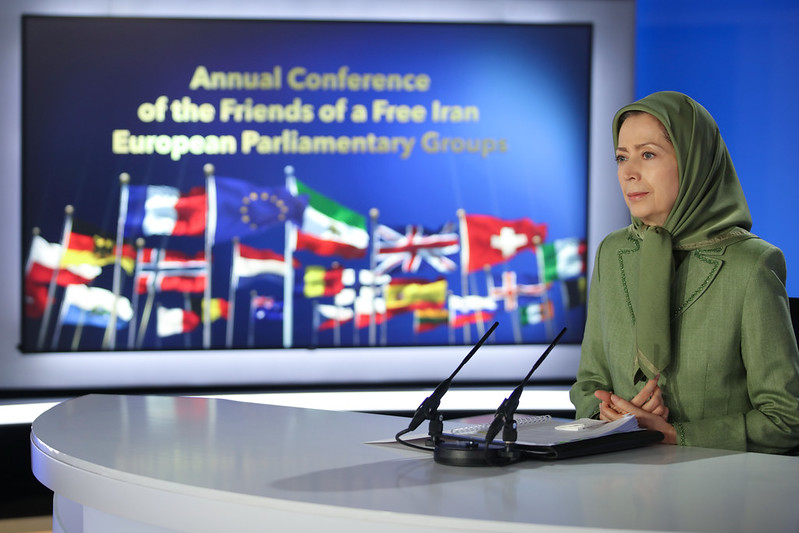
The annual “Friends of a Free Iran” (FoFI) event took place on February 9, with Members of the European Parliament and MPs from the parliaments of 19 countries in attendance. The President-elect of the National Council of Resistance of Iran (NCRI), Maryam Rajavi was the event’s keynote speaker.
Participants at the event were from the following countries: The United Kingdom; Germany; France; Italy; Switzerland; Finland; Norway; Iceland; the Netherlands; Belgium; Spain; Portugal; Ireland; Romania; Malta; Lithuania; Slovenia; Poland; San Marino; and Australia.
Antonio Stango, the President of the Italian Federation for Human rights opened the event stating, “As a friend of Free Iran, we express our support for the struggle of the Iranian people and Resistance to overthrow this religious tyranny and for the establishment of a democratic and pluralistic republic which will serve peace and stability. We begin today’s joint session with opening remarks from Mrs. Maryam Rajavi who will give us first-hand information on the current situation in Iran prospects for Iran’s future.”
Maryam Rajavi began her address by praising the martyrs who gave their lives during the Iranian Revolution in 1979, and highlighted that the current protests and resistance against the Iranian regime are simply the continuation of the fight which began 43 years ago.
The NCRI said, “Most of the dilemmas before Iran’s society today have become critical and reached a point of no return against the regime itself, leading to workers, farmers, teachers, and other sectors of society rising in revolt.”
Since late 2017, numerous nationwide protests have taken place in Iran. In a bid to quell the unrest and control the country’s crises, the regime’s Supreme Leader Ali Khamenei began to close ranks within the regime to consolidate his hold on power. One such move he made during this time was to install Ebrahim Raisi as the regime’s president last year. Raisi, known as the ‘Butcher of the 1988 massacre’, was chosen purely because of his notoriety in his nonchalance to committing brutal crimes against humanity. His nickname refers to his involvement in the massacre of 30,000 political prisoners in the summer of 1988, the majority of whom were members of the regime’s opposition group, the People’s Mojahedin Organization of Iran (PMOI/MEK).
Since its conception, the regime has viewed the MEK, as well as other Resistance groups, as existential threats. As a result, the regime consistently targets them in domestic and foreign policies, even pushing propaganda to paint them as the enemy.
Former MEP Struan Stevenson spoke during the FoFI event, saying, “When I heard that Ebrahim Raisi was intending to come to Glasgow last November to attend the COP 26 climate change summit, we submitted a huge dossier of evidence from survivors of the 1988 massacre and from families of the victims to the British police, calling for his indictment for crimes against humanity and for genocide under universal jurisdiction and calling for him to be arrested if he set foot in the United Kingdom.”
He added that at the very last minute, Raisi appeared to have changed his mind about attending the summit, with an announcement on state television claiming that he never had any intention of attending.
John Perry, the former Irish prime minister gave criticism to the approach of appeasement policies towards the regime by many European governments, stating, “The European government’s silence, which is intolerable, has been a significant enabler for the Tehran regime to continue its horrendous domestic crimes, foreign terrorism, nuclear ambitions, with complete impunity to date, and we certainly think we must call on the European National governments.”
Former member of the Lithuanian Parliament, Gideos Varekis highlighted the importance to hold regime officials accountable for their roles in the 1988 massacre, stating that many United Nations officials and human rights experts have classed the massacre not just as a brutal crime against humanity, but an act of genocide. Calls for an international investigation based from this classification have been ringing out consistently in recent years.
Mario Galea, the MP from Malta praised Maryam Rajavi for inspiring the younger generations of Iranians and fighting to create a better future and a free Iran for them.
He said, “Regretfully, we are living in a world which is heavily sedated by indifference, selfishness, stupidity, or short-sightedness. A world which foolishly chooses to wait till tomorrow to condemn crimes against humanity in Iran rather than acting today to prevent.”